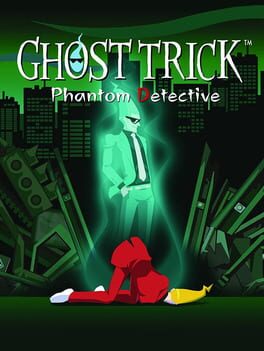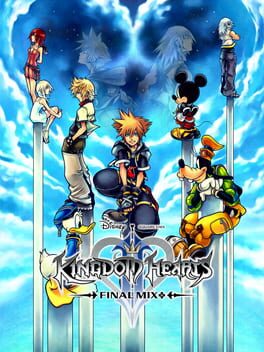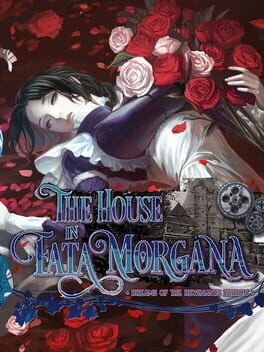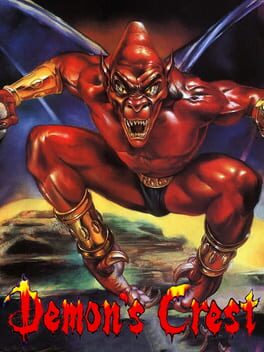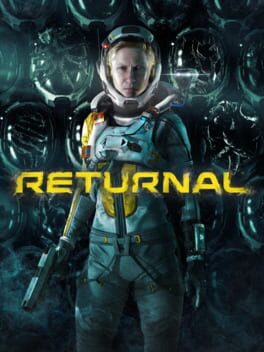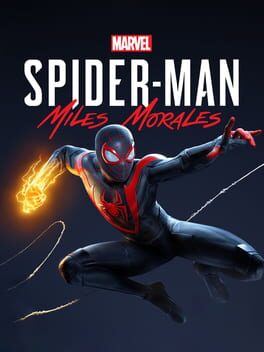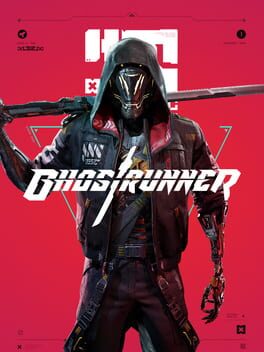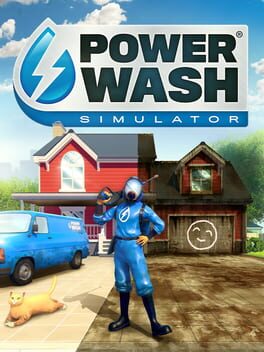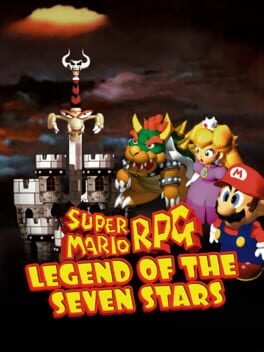GodManAntilope
Bio
I have terrible taste but for good reasons
I have terrible taste but for good reasons
Badges

Gone Gold
Received 5+ likes on a review while featured on the front page

GOTY '23
Participated in the 2023 Game of the Year Event

Loved
Gained 100+ total review likes

GOTY '22
Participated in the 2022 Game of the Year Event

3 Years of Service
Being part of the Backloggd community for 3 years

Best Friends
Become mutual friends with at least 3 others

GOTY '21
Participated in the 2021 Game of the Year Event

Well Written
Gained 10+ likes on a single review

Popular
Gained 15+ followers

Liked
Gained 10+ total review likes

Noticed
Gained 3+ followers

N00b
Played 100+ games
Favorite Games
243
Total Games Played
000
Played in 2024
003
Games Backloggd
Recently Played See More
Recently Reviewed See More
This game directly fuels my depression.
Now, this is not a statement about the basic conceit of the game or how well that conceit is adapted into gameplay, but this (and I assume other) simulation of menial labour without any purpose makes me enter a very troublesome state of mind.
The basic gameplay loop of having to clean several giant buildings and vehicles with a basic toolset that barely changes is neither a fun not otherwise satisfying undertaking for me, but that alone doesn’t really trigger negative thoughts, it’s just kind of boring to me. The worst part about it is that despite its very apparent repetetiveness and simplicity it is highly addicting, because the game gives you a neat checklist and small visual and auditory rewards for cleaning every single surface. Every time you clean a surface to an amount the game deems “good enough to be done” (usually a very reasonable estimate by the game devs) a small reward sound plays and the surface in question blinks white, as to suggest that it’s now clean and polished. The game is also not entirely without merits in regards to moment-to-moment decision-making, you can use different nozzles and cleaning agents - not to mention navigating the space to reach the more elusive spots. If you wanted to challenge yourself by speedrunning this game I assume it’d be fun in weird way.
This level of engagement to my reptile brain is just enough to keep going despite not getting any actual fulfillment from it. The problem is obvious: This game traps me. I play this game for 2 hours to clean a carousel and while I do get a momentary dopamine hit for each surface cleaned, this is not an intrinsic reward for me, and it doesn’t even elicit a genuine feeling of accomplishment. It’s just the game telling me: “You’ve done a good job! Here, have a treat.” There is no emotional arc here, there is no relaxation from a real-life work day, and this game just feels like unpaid and unsatisfying labour. In the real world, I could very likely feel a sense of purpose for this work, simply because I’d be materially helping people and restoring real properties to their former beauty, but I do not derive any enjoyment from menial tasks done for the sake of themselves. When you clean a property in this game, it will just stay cleaned in the transient digital void, for no one (not even yourself) to ever appreciate that work again.
I do not believe the makers of this game are incompetent, quite the opposite actually - They tried to build a game for people to relax, give some people a little reward here and there, and if these extrinsic pats on the back actually do it for you and make your day better, I am genuinely happy for you. But I also can’t deny what this game does me. It makes me feel like I wasted hours of my life doing nothing of value. Just the thought of booting it up again makes me feel anxious, because I don’t want to get caught in this loop again. The only thing of value I could extract from this game is that I learned something about myself: I should listen to the warning signs of a mental treadmill like this sooner. That nagging feeling that I’m not actually having fun and just going through the motions is probably right.
Now, this is not a statement about the basic conceit of the game or how well that conceit is adapted into gameplay, but this (and I assume other) simulation of menial labour without any purpose makes me enter a very troublesome state of mind.
The basic gameplay loop of having to clean several giant buildings and vehicles with a basic toolset that barely changes is neither a fun not otherwise satisfying undertaking for me, but that alone doesn’t really trigger negative thoughts, it’s just kind of boring to me. The worst part about it is that despite its very apparent repetetiveness and simplicity it is highly addicting, because the game gives you a neat checklist and small visual and auditory rewards for cleaning every single surface. Every time you clean a surface to an amount the game deems “good enough to be done” (usually a very reasonable estimate by the game devs) a small reward sound plays and the surface in question blinks white, as to suggest that it’s now clean and polished. The game is also not entirely without merits in regards to moment-to-moment decision-making, you can use different nozzles and cleaning agents - not to mention navigating the space to reach the more elusive spots. If you wanted to challenge yourself by speedrunning this game I assume it’d be fun in weird way.
This level of engagement to my reptile brain is just enough to keep going despite not getting any actual fulfillment from it. The problem is obvious: This game traps me. I play this game for 2 hours to clean a carousel and while I do get a momentary dopamine hit for each surface cleaned, this is not an intrinsic reward for me, and it doesn’t even elicit a genuine feeling of accomplishment. It’s just the game telling me: “You’ve done a good job! Here, have a treat.” There is no emotional arc here, there is no relaxation from a real-life work day, and this game just feels like unpaid and unsatisfying labour. In the real world, I could very likely feel a sense of purpose for this work, simply because I’d be materially helping people and restoring real properties to their former beauty, but I do not derive any enjoyment from menial tasks done for the sake of themselves. When you clean a property in this game, it will just stay cleaned in the transient digital void, for no one (not even yourself) to ever appreciate that work again.
I do not believe the makers of this game are incompetent, quite the opposite actually - They tried to build a game for people to relax, give some people a little reward here and there, and if these extrinsic pats on the back actually do it for you and make your day better, I am genuinely happy for you. But I also can’t deny what this game does me. It makes me feel like I wasted hours of my life doing nothing of value. Just the thought of booting it up again makes me feel anxious, because I don’t want to get caught in this loop again. The only thing of value I could extract from this game is that I learned something about myself: I should listen to the warning signs of a mental treadmill like this sooner. That nagging feeling that I’m not actually having fun and just going through the motions is probably right.
Once severely maligned by casual players and hardcore fans of the series alike, Final Fantasy 13 has been nothing but vindicated by the success of Final Fantasy 7 Remake. A hybrid combat system with both real-time and turn-based elements. A strong focus on characters and vistas. The presentation of the world as a sight-seeing tour through mostly linear corridors.
This might feel very contentious to a lot of people, but it’s true that a lot of 13’s DNA is present in 7R, and for the most part, 13 just does it flat out better. This game has a strong focus on its central mechanics - the combat system. It’s the central way of engaging with the game, and – spin-offs excluded – it’s one of the most combat-heavy Final Fantasy games to date, with even the more exploration-heavy areas having combat as their main reward.
The combat is designed really well - a very compact system that lets you do decisions about a meta-level of play that any sensible player already knows how to employ if they ever touched a turn-based combat system. As the developer correctly surmised, there is no challenge anymore in menuing to a Cure spell every other round to keep the party alive, especially for JRPG veterans. Final Fantasy 13 still seeks its identity in an idea adjacent to ATB, although the real-time component of older Final Fantasies mattered too little to actually make the quick menuing dangerous to your party. Final Fantasy 13 solves these problems: It relieves you of the burden to micromanage and additionally makes the real-time component integral to the challenge by constantly pressuring you to make quick decisions.
The focus in the battle system lies on choosing the correct strategy and not telling each character exactly what to do. These strategies are defined by the “roles” each character has, and these roles define what moves a character has and how they will behave. There are 6 roles in the game, each character has 3 of those 6 roles as their “main” roles, in which they excel. Each possible role combination of the 3 active characters is a “paradigm”. One of the genius parts of this battle system is that you can only choose 6 paradigms before each battle in your load-out, which means you have to leave a lot of possible options on the table and still have to be prepared for all eventualities that might occur in the battle. The game would arguable devolve into just another form of micro-managing if you could assign roles individually during a battle, so I welcome this limitation. There will always be some fights where you won’t have the optimal paradigms equipped, and still winning quickly despite that is what makes you feel like you really understood the ins and outs of the game.
During battle you only directly control your party leader, meaning the other characters behave autonomously according to their role and the current state of the battle. The fact that the automated characters almost always (and by almost I really do mean 99+% of the time) make sensible choices in combat is a testament to how simple the rules of menu-based combat usually are. Even for the party leader, the game gives you an option to preselect the character moves for you, still abiding by the thought that what you have before you is probably an easily solvable problem, as long as you have the correct strategy in mind. You can – of course – always manually choose the inputs of the party leader to optimize everything a bit further, and that is sometimes a key component of harder boss fights, but micromanaging one character in a tight situation is a far cry from inputting moves for every character each round regardless of the current battle complexity.
This all begs the question, if everything is automated, surely the game must not be very challenging? The answer is: Kind of. Final Fantasy 13 can be an easy game if you just try to play it safe and survive at any cost, but playing that way is highly discouraged through fostering intrinsic and extrinsic motivation. The really smart thing about this combat system is how the game tries to get you to overextend yourself, and it has 2 main ways of doing this: The ranking system and the stagger system.
The ranking system is very simple, but elegant for this purpose: The faster you complete a battle, the better your rank is and a better rank means you get better items. This gives you an additional extrinsic motivation for optimization and going for offense, and it cost me quite a few battles just because I really wanted a full 5 star rating and made an unsafe decision because of that. It’s very to the point: “You could have been faster“, and holding this over your head alone is a great motivator and factor that keeps pushing you into new strategies.
The other way the game tries to goad you into making mistakes is the stagger system. Most modern Final Fantasy games have the stagger system as a bar that fills upon attacking the enemy until it – on completion – stuns the enemy for a brief period of time and gives you a damage multiplier on your attacks during that period. The interesting thing about this is that 13 is the first FF to ever employ this system, and it’s still by far the most interesting iteration. In this game it’s not only designed to give you catharsis through a bigger damage output through upon completing the bar, it actually has a few more purposes that feed directly back into the idea of letting the player make more mistakes.
The stagger bar in Final Fantasy 13 isn’t just a constantly filling bar that rewards you with a damage multiplier at the end, it consistently rises and increases the multiplier with each hit. The bar also constantly reduces (not the multiplier!) and only resets when you do a hit to the enemy. Upon the bar reaching zero, you lose the current damage multiplier and you effectively have to start your offense over again, only keeping the HP damage you did to the enemy up to that point. This, of course, means you have to constantly keep pressuring an enemy if you want to end up doing substantive damage, not to mention that keeping an enemy in check during stagger is much easier, since he is more easily interruptable.
Playing defensively is of course still an option, and having a paradigm only consisting of defensive roles is sometimes even necessary to survive, but keep that formation running for too long and you potentially nullify all effort you have put into the battle offensively. Again, this constant feeling of push-and-pull to keep going is great at getting you to overextend yourself and make bad decisions. You might be able to put all characters into an attacking role and fill the stagger bar before any of your characters die, but making the right judgment call when you go for the final part of the stagger bar is crucial. There are bosses in this game that attack relentlessly, finding windows to attack and quickly fill their stagger bar always feels like a gamble, but at some point you want to take the proverbial leap of faith and go into complete offense, lest you turtle even longer and lose that sweet 5 star rating. All systems in the game interlock masterfully to give you this one goal: Minimal defense, maximum offense.
Of course, all of this would be useless if every battle played the same. Luckily, the game understands this and has a wide variety of enemies and enemy formations that each require different strategies. The further you get in the game, the more enemy combinations make it hard to map out the encounter strategy in your head: Who should you deal with first? Can you get through this with a short buffing period? Should you have a safety healer on hand or just bumrush the enemies with a completely offensive strategy? Which offensive strategy? Is debuffing key here or not? These questions constantly turn up in play, and it’s basically guaranteed you will keep dying and learning to deal with new formations thrown at you throughout the whole game. As the game progresses, paradigm changes will happen quicker and you will sometimes change up the strategy to simply execute a single move and then move on to the next paradigm. The challenge escalates and the gameplay becomes more frantic as you go, which is an impressive feat for 30+ hour game.
One problem the game has here is that the pacing of the variation of combat encounters could be faster in a lot of chapters. There is a lot of monotony in certain locations, even with the whole idea of optimizing the battles. Some sections drag out too long and throw too many similar enemy formations at you to keep pace with player skill – which is a shame, considering that the chapter-to-chapter escalation is really solid otherwise. It feels like the developers wanted to play it too safe at some points or that they wanted to preserve the “feeling” of older RPGs where you fight each enemy more often.
The “RPG” part of the game is really digestible: All of the customization in FF 13 comes from equipment, and every character only has effectively 3 stats: Strength, Magic and HP. The lack of any defensive stat is welcome, since most RPGs don’t actually handle the potential tradeoff between defense and HP interestingly, and it only muddles the water in what the player should invest in. Some accessories grant you defensive boosts against certain types of attacks, but these correspond to flat percentage damage reductions and are therefore easily understandable.
The game is essentially one long ride from battle to battle with some sight-seeing inbetween, but I do mean that positively – mostly. The game still looks amazing, even by today’s standards, and it’s not only impressive what Square got out of 7th gen hardware, but also how fresh and unique the environments and characters in this game feel. Final Fantasy 13 presents a world that is torn between technology and naturality and everything about its visuals underscores this dichotomy. The “gods” of this world – the Fal’cie – do not fall into any standard depiction of supernaturality, they are machinistic and technologic at their core, giant and complex machines beyond our comprehension. The designs of these beings vary wildly, but they are all cohesive in that they feel fundamentally alien and slightly unsettling, almost like a mechanical version of Lovecraft’s elder gods or the often quoted “biblically accurate angels”. This is not only a very unique design choice, it also drives home the point that these beings are at odds with the natural order of the world and with the humans that reside in it.
Even the music hones in on this theme – Masashi Hamauzu created an incredible soundtrack that underscores this conflict between man and machine by mixing up electronic and orchestral music. Some of the best music in the series is here, the somber “Dust to Dust” being one of the most powerful ballads these games have to show for themselves. Hearing the haunting vocals in the melody of the games’ leitmotif while witnessing the desolation around you is a moment that will always stay with me. The main battle theme “Blinded by Light” is a triumphant orchestral piece that never gets grating and, even at the end, had me humming along with the melody. The pop track “The Sunleth Waterscape” is (in)famous for how schmaltzy it is, but that exact type of unapologetic commitment to a corny pop track is what ends up making it so charming, and it ends up being one of the highlights of the soundtrack for it.
The pacing and story of Final Fantasy 13 are probably its weakest part – many of the emotional beats miss their mark, because the melodrama has been built up in a way that feels too convoluted. The best example here is the emotional arc between Snow and Hope, which falls flat for several reasons; The biggest one being that Hope takes way too long to confront Snow about his anger and Snow making way too many convoluted and incidental remarks that specifically only serve to strenghten Hope’s grudge against Snow. While the player already knows how both characters feel, we are strung along for a very drawn-out conflict that resolves unsatisfyingly. That’s not to say that none of these emotional beats work – Final Fantasy 13 is at its best when it’s drenched in straightforward, unapologetic pathos. Each of the characters has their own moment when they decide that they “can’t run away anymore”, metaphorically speaking, and this works better for some and worse for others, courtesy of what these characters are actually running from. Sazh’s story of grappling with his feelings as a father is probably the arc that resonates the most, and the game’s theme of pushing forward is at its most personal here, and I would argue that it also has the fewest problems with its pacing.
Another problem with the story is that some aspects keep being weirdly underexplained, even if you sift through the written datalogs. Especially the character motivations of Fang are confusing – who has a crucial role in the games’ finale. Her behaviour takes quite a bit of the hype out of the climax, despite the otherwise great presentation.
Final Fantasy 13 is one of those games that really struck a nerve with me despite its obvious issues. It will stay with me for longer and give me more to think about than most other linear JRPGs, because what I see here is an extremely interesting and highly successful attempt at deconstructing menu-based combat and trying to translate it to a meta-level, making a point to be less about singular actions and more about character behaviours, and it succeeds marvelously at that. It presents an ambitious idea at a combat system for veterans of the genre that are a tired of just hitting obvious choices in menus and already think about each fight in terms of roles and tactics.
It’s a game that has a very strong visual and auditory identity on top of that, and I can’t really say I played another game that felt, sounded or looked anything close to it. It’s a unique gem in the JRPG sphere in both gameplay and presentation, and even if you don’t mesh with all the things I mentioned as much as I do, I would still recommend giving it a shot, because it does present something far away from the typical fare the genre is known for.
This might feel very contentious to a lot of people, but it’s true that a lot of 13’s DNA is present in 7R, and for the most part, 13 just does it flat out better. This game has a strong focus on its central mechanics - the combat system. It’s the central way of engaging with the game, and – spin-offs excluded – it’s one of the most combat-heavy Final Fantasy games to date, with even the more exploration-heavy areas having combat as their main reward.
The combat is designed really well - a very compact system that lets you do decisions about a meta-level of play that any sensible player already knows how to employ if they ever touched a turn-based combat system. As the developer correctly surmised, there is no challenge anymore in menuing to a Cure spell every other round to keep the party alive, especially for JRPG veterans. Final Fantasy 13 still seeks its identity in an idea adjacent to ATB, although the real-time component of older Final Fantasies mattered too little to actually make the quick menuing dangerous to your party. Final Fantasy 13 solves these problems: It relieves you of the burden to micromanage and additionally makes the real-time component integral to the challenge by constantly pressuring you to make quick decisions.
The focus in the battle system lies on choosing the correct strategy and not telling each character exactly what to do. These strategies are defined by the “roles” each character has, and these roles define what moves a character has and how they will behave. There are 6 roles in the game, each character has 3 of those 6 roles as their “main” roles, in which they excel. Each possible role combination of the 3 active characters is a “paradigm”. One of the genius parts of this battle system is that you can only choose 6 paradigms before each battle in your load-out, which means you have to leave a lot of possible options on the table and still have to be prepared for all eventualities that might occur in the battle. The game would arguable devolve into just another form of micro-managing if you could assign roles individually during a battle, so I welcome this limitation. There will always be some fights where you won’t have the optimal paradigms equipped, and still winning quickly despite that is what makes you feel like you really understood the ins and outs of the game.
During battle you only directly control your party leader, meaning the other characters behave autonomously according to their role and the current state of the battle. The fact that the automated characters almost always (and by almost I really do mean 99+% of the time) make sensible choices in combat is a testament to how simple the rules of menu-based combat usually are. Even for the party leader, the game gives you an option to preselect the character moves for you, still abiding by the thought that what you have before you is probably an easily solvable problem, as long as you have the correct strategy in mind. You can – of course – always manually choose the inputs of the party leader to optimize everything a bit further, and that is sometimes a key component of harder boss fights, but micromanaging one character in a tight situation is a far cry from inputting moves for every character each round regardless of the current battle complexity.
This all begs the question, if everything is automated, surely the game must not be very challenging? The answer is: Kind of. Final Fantasy 13 can be an easy game if you just try to play it safe and survive at any cost, but playing that way is highly discouraged through fostering intrinsic and extrinsic motivation. The really smart thing about this combat system is how the game tries to get you to overextend yourself, and it has 2 main ways of doing this: The ranking system and the stagger system.
The ranking system is very simple, but elegant for this purpose: The faster you complete a battle, the better your rank is and a better rank means you get better items. This gives you an additional extrinsic motivation for optimization and going for offense, and it cost me quite a few battles just because I really wanted a full 5 star rating and made an unsafe decision because of that. It’s very to the point: “You could have been faster“, and holding this over your head alone is a great motivator and factor that keeps pushing you into new strategies.
The other way the game tries to goad you into making mistakes is the stagger system. Most modern Final Fantasy games have the stagger system as a bar that fills upon attacking the enemy until it – on completion – stuns the enemy for a brief period of time and gives you a damage multiplier on your attacks during that period. The interesting thing about this is that 13 is the first FF to ever employ this system, and it’s still by far the most interesting iteration. In this game it’s not only designed to give you catharsis through a bigger damage output through upon completing the bar, it actually has a few more purposes that feed directly back into the idea of letting the player make more mistakes.
The stagger bar in Final Fantasy 13 isn’t just a constantly filling bar that rewards you with a damage multiplier at the end, it consistently rises and increases the multiplier with each hit. The bar also constantly reduces (not the multiplier!) and only resets when you do a hit to the enemy. Upon the bar reaching zero, you lose the current damage multiplier and you effectively have to start your offense over again, only keeping the HP damage you did to the enemy up to that point. This, of course, means you have to constantly keep pressuring an enemy if you want to end up doing substantive damage, not to mention that keeping an enemy in check during stagger is much easier, since he is more easily interruptable.
Playing defensively is of course still an option, and having a paradigm only consisting of defensive roles is sometimes even necessary to survive, but keep that formation running for too long and you potentially nullify all effort you have put into the battle offensively. Again, this constant feeling of push-and-pull to keep going is great at getting you to overextend yourself and make bad decisions. You might be able to put all characters into an attacking role and fill the stagger bar before any of your characters die, but making the right judgment call when you go for the final part of the stagger bar is crucial. There are bosses in this game that attack relentlessly, finding windows to attack and quickly fill their stagger bar always feels like a gamble, but at some point you want to take the proverbial leap of faith and go into complete offense, lest you turtle even longer and lose that sweet 5 star rating. All systems in the game interlock masterfully to give you this one goal: Minimal defense, maximum offense.
Of course, all of this would be useless if every battle played the same. Luckily, the game understands this and has a wide variety of enemies and enemy formations that each require different strategies. The further you get in the game, the more enemy combinations make it hard to map out the encounter strategy in your head: Who should you deal with first? Can you get through this with a short buffing period? Should you have a safety healer on hand or just bumrush the enemies with a completely offensive strategy? Which offensive strategy? Is debuffing key here or not? These questions constantly turn up in play, and it’s basically guaranteed you will keep dying and learning to deal with new formations thrown at you throughout the whole game. As the game progresses, paradigm changes will happen quicker and you will sometimes change up the strategy to simply execute a single move and then move on to the next paradigm. The challenge escalates and the gameplay becomes more frantic as you go, which is an impressive feat for 30+ hour game.
One problem the game has here is that the pacing of the variation of combat encounters could be faster in a lot of chapters. There is a lot of monotony in certain locations, even with the whole idea of optimizing the battles. Some sections drag out too long and throw too many similar enemy formations at you to keep pace with player skill – which is a shame, considering that the chapter-to-chapter escalation is really solid otherwise. It feels like the developers wanted to play it too safe at some points or that they wanted to preserve the “feeling” of older RPGs where you fight each enemy more often.
The “RPG” part of the game is really digestible: All of the customization in FF 13 comes from equipment, and every character only has effectively 3 stats: Strength, Magic and HP. The lack of any defensive stat is welcome, since most RPGs don’t actually handle the potential tradeoff between defense and HP interestingly, and it only muddles the water in what the player should invest in. Some accessories grant you defensive boosts against certain types of attacks, but these correspond to flat percentage damage reductions and are therefore easily understandable.
The game is essentially one long ride from battle to battle with some sight-seeing inbetween, but I do mean that positively – mostly. The game still looks amazing, even by today’s standards, and it’s not only impressive what Square got out of 7th gen hardware, but also how fresh and unique the environments and characters in this game feel. Final Fantasy 13 presents a world that is torn between technology and naturality and everything about its visuals underscores this dichotomy. The “gods” of this world – the Fal’cie – do not fall into any standard depiction of supernaturality, they are machinistic and technologic at their core, giant and complex machines beyond our comprehension. The designs of these beings vary wildly, but they are all cohesive in that they feel fundamentally alien and slightly unsettling, almost like a mechanical version of Lovecraft’s elder gods or the often quoted “biblically accurate angels”. This is not only a very unique design choice, it also drives home the point that these beings are at odds with the natural order of the world and with the humans that reside in it.
Even the music hones in on this theme – Masashi Hamauzu created an incredible soundtrack that underscores this conflict between man and machine by mixing up electronic and orchestral music. Some of the best music in the series is here, the somber “Dust to Dust” being one of the most powerful ballads these games have to show for themselves. Hearing the haunting vocals in the melody of the games’ leitmotif while witnessing the desolation around you is a moment that will always stay with me. The main battle theme “Blinded by Light” is a triumphant orchestral piece that never gets grating and, even at the end, had me humming along with the melody. The pop track “The Sunleth Waterscape” is (in)famous for how schmaltzy it is, but that exact type of unapologetic commitment to a corny pop track is what ends up making it so charming, and it ends up being one of the highlights of the soundtrack for it.
The pacing and story of Final Fantasy 13 are probably its weakest part – many of the emotional beats miss their mark, because the melodrama has been built up in a way that feels too convoluted. The best example here is the emotional arc between Snow and Hope, which falls flat for several reasons; The biggest one being that Hope takes way too long to confront Snow about his anger and Snow making way too many convoluted and incidental remarks that specifically only serve to strenghten Hope’s grudge against Snow. While the player already knows how both characters feel, we are strung along for a very drawn-out conflict that resolves unsatisfyingly. That’s not to say that none of these emotional beats work – Final Fantasy 13 is at its best when it’s drenched in straightforward, unapologetic pathos. Each of the characters has their own moment when they decide that they “can’t run away anymore”, metaphorically speaking, and this works better for some and worse for others, courtesy of what these characters are actually running from. Sazh’s story of grappling with his feelings as a father is probably the arc that resonates the most, and the game’s theme of pushing forward is at its most personal here, and I would argue that it also has the fewest problems with its pacing.
Another problem with the story is that some aspects keep being weirdly underexplained, even if you sift through the written datalogs. Especially the character motivations of Fang are confusing – who has a crucial role in the games’ finale. Her behaviour takes quite a bit of the hype out of the climax, despite the otherwise great presentation.
Final Fantasy 13 is one of those games that really struck a nerve with me despite its obvious issues. It will stay with me for longer and give me more to think about than most other linear JRPGs, because what I see here is an extremely interesting and highly successful attempt at deconstructing menu-based combat and trying to translate it to a meta-level, making a point to be less about singular actions and more about character behaviours, and it succeeds marvelously at that. It presents an ambitious idea at a combat system for veterans of the genre that are a tired of just hitting obvious choices in menus and already think about each fight in terms of roles and tactics.
It’s a game that has a very strong visual and auditory identity on top of that, and I can’t really say I played another game that felt, sounded or looked anything close to it. It’s a unique gem in the JRPG sphere in both gameplay and presentation, and even if you don’t mesh with all the things I mentioned as much as I do, I would still recommend giving it a shot, because it does present something far away from the typical fare the genre is known for.
While I am not the greatest fan of Chrono Trigger, I can at least appreciate it for trying to streamline the JRPG formula into a digestible and well presented format. It’s like a summer blockbuster: Not a lot to chew on, but you’ll leave the theater satisfied, and hey, you might wanna watch it again some time. It has interesting setpieces, great music, charming art design, it’s the exact kind of style-over-substance package that I can enjoy - and the parts of it that are actually idiosyncratic are genuinely interesting. I love the option to end the game prematurely at any point, for example, it’s a serious commitment to the whole idea of fighting a time traveling cosmic horror.
Now why am I comparing this game to critical darling Chrono Trigger? For Super Mario RPG it really does make sense: It’s a Squaresoft game, it’s meant for more casual players and it mainly tries to capture the audience through a “vibe”, an experience. To me, it seems like Super Mario RPG is trying to do the same kind of trick – pulling the wool over your eyes with its own sense of style and wackiness, trying to get you to hop on the ride and just have some fun with Mario’s shenanigans in this even-more-cartoonish-than-usual depiction of the Mushroom Kingdom.
But It just doesn’t work. I don’t care about Mario’s ride. Super Mario RPG fails at a very fundamental level to engage me and I almost feel bad for not “getting” it, because it’s trying so hard to be cute and charming, but it’s falling flat at every corner.
My biggest point of contention is that the core mechanics of the game just don’t really feel good. There is nothing to keep me even superficially engaged in the battle system, because every fight is laughably easy if you pay the slightest bit of attention, the attack animations are decent, but not outstanding, and worst of all, the action commands feel limp. The latter might seem like a small thing - you could almost call it a nitpick - but considering this is the action you do most often in combat, it only makes sense that it should be polished to a ridiculous degree, and it just isn’t. If you force me to do a timed button press for every single attack and to defend against every enemy attack during your 15-20 hour turn based RPG, you better make really damn sure that it feels incredible to do so. Give it some real crunch, make me feel that I succeeded, make me smile in anticipation before Mario attacks and make me hit that button with entusiasm, make a sound effect that evokes power, show me how the enemy reacts to my defensive action command, give it all some real visual flair. The action commands in this game feel like slapping 2 dry sponges together, I feel nothing when I pull them off. Where Paper Mario plays with sound effect crescendos and large visual indicators of success, Super Mario RPG does a little unsatisfactory jingle and puts some colored stars on the screen and calls it a day. This feeling isn’t helped by the fact that the timing for the special commands is weirdly obtuse and trial-and-error; some attacks have their timing window when the character is taking a swing, some have their window when the attack hits the enemy, and some have their timing window at an undiscernible point somewhere inbetween - and there is no actual indicator to tell when the button really needs to be pushed. You might say this type of timing trial and error is fun, but it’s not.
My second larger point of contention is that the general dungeon design is just forgettable. Most areas feel like a haphazardly slapped together collection of assets and rooms with enemies placed in random spots. Only a few rooms really give off the feeling that they have any deeper design thought put into them – platforming rooms, puzzle rooms or dungeon segments that pose any navigational challenge are rare. The dungeons are largely affairs of walking from point A to point B and fighting enemies inbetween (or not). None of the treasure chest placements are particularly exciting, either. If the dungeons were at least visually interesting or would transport an interesting theme, I could even forgive lackluster dungeon design, but a lot of the dungeons are just the most generic ideas you can think of for JRPGs. Forests. Roads. Sewers. A cave. A mountain. Riveting stuff. The worst part about it that there is so much use of recoloured assets between these excuses for dungeon ideas that there is no way they could ever shine. I am not saying that a Forest is an inherently bad dungeon setting if you pull it off with an interesting aesthetical style, but Super Mario RPG once again simply does not. The forests, roads, caves are neither mysterious, magical, nor do they even have interesting colour schemes, no, it’s just plain old forests, roads and caves. It tries to get away by painting over standard scenarios with it’s claymation art style and by injecting some Mario-Isms, but that’s too little to get away with ideas this generic. Even at its most creative, Mario RPG gets a “that’s kind of neat” out of me. A far cry from the medieval churches, futuristic factories, and ancient civilations from something like Chrono Trigger.
You might say that at least the visual style of the game is interesting and Super Mario RPGs character design really is one of its most distinctive traits, but also one of its most dissonant when it uses enemy designs that don’t fit the Mario mold. Why are there some designs that are trying to be spooky or unnerving (in children’s terms of course) when a lot of other enemies are just goofy looking cartoons? It feels a bit too directionless, there is also no coherent throughline for enemy types within a location. Some enemies are just funny little guys, and some are actual monsters you could describe as such. The character design doesn’t feel cohesive, it just feels like some were designed by Nintendo staff and others by Squaresoft staff.
The weirdest part is that by using these distinctly Non-Nintendo character designs in this setting, it feels like the game isn’t actually convinced that the Mario aesthetic is deserving of an RPG on its own. The principal antagonists are distinctly industrial entities, meant to represent weapons like knives, hammers and spears, whereas the known inhabitants of the mushroom kingdom are what you could call "core scrimblo". This feels weirdly out of place with the conceit that the game is entirely non-serious in its presentation of the story and the characters. There are basically no characters arcs or philosophies at play here, it’s just Mario fending off some invaders and it doesn’t really matter who those invaders are or why they are doing it. One of the first situations you are confronted with are Shy Guys on Pogo Sticks invading a town that you save by fighting a giant knife, and it doesn’t really get any more serious from there. The aesthetical contradictions could have been used to make a point, but the game doesn’t try to, and that makes it feel needlessly confused. At no point in the story is any real drive felt, it’s all silly and meant to be funny, so what is the point of the contrasting designs?
Since the story is so light-hearted, the jokes should at least land, but Mario RPG even fails at being funny most of the time – a lot the humor in the game is just the general idea of some concept or character trait being funny inherently, and these aren’t utilized for real set-ups and punchlines. An easy example: Bowser is a tough guy who is actually more worried about everything than he lets on, and he sometimes lets this slip. That’s the joke. There is no real execution at hand here, just wild gesturing in the direction of this contradictory behaviour. I am going cut the game some slack when I say that this is maybe the result of a subpar translation, because character reactions during story happenings also sometimes don’t really fit what is being said, but this still doesn't excuse the experience I had with that translation. Speaking of story, many of the humorous cutscenes feel like they are supposed to be somehow inherently funny because the main characters are pantomiming what happened to other characters. Now, character sprites in a SNES game are a rather limited resource, so what Mario and his friends are actually pantomiming at other people is often visually underwhelming, and it feels like I’m just supposed to laugh at the idea of pantomiming itself? The incidental jokes and cutscenes reflect a very superficial approach to humor where I feel I am supposed to laugh at the set up for a joke that is never followed up on.
If there is one thing I can say in favor of the game, it’s that I like the music. While it’s not my favorite SNES soundtrack, I can say that I had fun listening to the songs in the different locales and during battles. It hits just the right tone between tension and playfulness, and it’s generally catchy - I even like some of the songs in isolation, which is not something that happens often to me with SNES tracks, to be truthful.
I hate to be this negative about a game that is by all accounts a work of love, but as a whole package I would never recommend it. It’s a confused mess, failing to straddle the line between both the “Mario” and the “RPG” part and ends up satisfying the wish for neither. It tries to be experiential but doesn’t actually pull out all the stops to be remembered on the basis of its story or its locales and it leaves me with a very unsatisfactory feeling, like I wasted my time wishing for more. I feel like I will have forgotten most of the dungeons and characters in a month. I hoped that Mario’s first foray into the world of numbers would be more exciting, but I think I can at least look forward to the other games in the Mario RPG series being more up my alley.
Now why am I comparing this game to critical darling Chrono Trigger? For Super Mario RPG it really does make sense: It’s a Squaresoft game, it’s meant for more casual players and it mainly tries to capture the audience through a “vibe”, an experience. To me, it seems like Super Mario RPG is trying to do the same kind of trick – pulling the wool over your eyes with its own sense of style and wackiness, trying to get you to hop on the ride and just have some fun with Mario’s shenanigans in this even-more-cartoonish-than-usual depiction of the Mushroom Kingdom.
But It just doesn’t work. I don’t care about Mario’s ride. Super Mario RPG fails at a very fundamental level to engage me and I almost feel bad for not “getting” it, because it’s trying so hard to be cute and charming, but it’s falling flat at every corner.
My biggest point of contention is that the core mechanics of the game just don’t really feel good. There is nothing to keep me even superficially engaged in the battle system, because every fight is laughably easy if you pay the slightest bit of attention, the attack animations are decent, but not outstanding, and worst of all, the action commands feel limp. The latter might seem like a small thing - you could almost call it a nitpick - but considering this is the action you do most often in combat, it only makes sense that it should be polished to a ridiculous degree, and it just isn’t. If you force me to do a timed button press for every single attack and to defend against every enemy attack during your 15-20 hour turn based RPG, you better make really damn sure that it feels incredible to do so. Give it some real crunch, make me feel that I succeeded, make me smile in anticipation before Mario attacks and make me hit that button with entusiasm, make a sound effect that evokes power, show me how the enemy reacts to my defensive action command, give it all some real visual flair. The action commands in this game feel like slapping 2 dry sponges together, I feel nothing when I pull them off. Where Paper Mario plays with sound effect crescendos and large visual indicators of success, Super Mario RPG does a little unsatisfactory jingle and puts some colored stars on the screen and calls it a day. This feeling isn’t helped by the fact that the timing for the special commands is weirdly obtuse and trial-and-error; some attacks have their timing window when the character is taking a swing, some have their window when the attack hits the enemy, and some have their timing window at an undiscernible point somewhere inbetween - and there is no actual indicator to tell when the button really needs to be pushed. You might say this type of timing trial and error is fun, but it’s not.
My second larger point of contention is that the general dungeon design is just forgettable. Most areas feel like a haphazardly slapped together collection of assets and rooms with enemies placed in random spots. Only a few rooms really give off the feeling that they have any deeper design thought put into them – platforming rooms, puzzle rooms or dungeon segments that pose any navigational challenge are rare. The dungeons are largely affairs of walking from point A to point B and fighting enemies inbetween (or not). None of the treasure chest placements are particularly exciting, either. If the dungeons were at least visually interesting or would transport an interesting theme, I could even forgive lackluster dungeon design, but a lot of the dungeons are just the most generic ideas you can think of for JRPGs. Forests. Roads. Sewers. A cave. A mountain. Riveting stuff. The worst part about it that there is so much use of recoloured assets between these excuses for dungeon ideas that there is no way they could ever shine. I am not saying that a Forest is an inherently bad dungeon setting if you pull it off with an interesting aesthetical style, but Super Mario RPG once again simply does not. The forests, roads, caves are neither mysterious, magical, nor do they even have interesting colour schemes, no, it’s just plain old forests, roads and caves. It tries to get away by painting over standard scenarios with it’s claymation art style and by injecting some Mario-Isms, but that’s too little to get away with ideas this generic. Even at its most creative, Mario RPG gets a “that’s kind of neat” out of me. A far cry from the medieval churches, futuristic factories, and ancient civilations from something like Chrono Trigger.
You might say that at least the visual style of the game is interesting and Super Mario RPGs character design really is one of its most distinctive traits, but also one of its most dissonant when it uses enemy designs that don’t fit the Mario mold. Why are there some designs that are trying to be spooky or unnerving (in children’s terms of course) when a lot of other enemies are just goofy looking cartoons? It feels a bit too directionless, there is also no coherent throughline for enemy types within a location. Some enemies are just funny little guys, and some are actual monsters you could describe as such. The character design doesn’t feel cohesive, it just feels like some were designed by Nintendo staff and others by Squaresoft staff.
The weirdest part is that by using these distinctly Non-Nintendo character designs in this setting, it feels like the game isn’t actually convinced that the Mario aesthetic is deserving of an RPG on its own. The principal antagonists are distinctly industrial entities, meant to represent weapons like knives, hammers and spears, whereas the known inhabitants of the mushroom kingdom are what you could call "core scrimblo". This feels weirdly out of place with the conceit that the game is entirely non-serious in its presentation of the story and the characters. There are basically no characters arcs or philosophies at play here, it’s just Mario fending off some invaders and it doesn’t really matter who those invaders are or why they are doing it. One of the first situations you are confronted with are Shy Guys on Pogo Sticks invading a town that you save by fighting a giant knife, and it doesn’t really get any more serious from there. The aesthetical contradictions could have been used to make a point, but the game doesn’t try to, and that makes it feel needlessly confused. At no point in the story is any real drive felt, it’s all silly and meant to be funny, so what is the point of the contrasting designs?
Since the story is so light-hearted, the jokes should at least land, but Mario RPG even fails at being funny most of the time – a lot the humor in the game is just the general idea of some concept or character trait being funny inherently, and these aren’t utilized for real set-ups and punchlines. An easy example: Bowser is a tough guy who is actually more worried about everything than he lets on, and he sometimes lets this slip. That’s the joke. There is no real execution at hand here, just wild gesturing in the direction of this contradictory behaviour. I am going cut the game some slack when I say that this is maybe the result of a subpar translation, because character reactions during story happenings also sometimes don’t really fit what is being said, but this still doesn't excuse the experience I had with that translation. Speaking of story, many of the humorous cutscenes feel like they are supposed to be somehow inherently funny because the main characters are pantomiming what happened to other characters. Now, character sprites in a SNES game are a rather limited resource, so what Mario and his friends are actually pantomiming at other people is often visually underwhelming, and it feels like I’m just supposed to laugh at the idea of pantomiming itself? The incidental jokes and cutscenes reflect a very superficial approach to humor where I feel I am supposed to laugh at the set up for a joke that is never followed up on.
If there is one thing I can say in favor of the game, it’s that I like the music. While it’s not my favorite SNES soundtrack, I can say that I had fun listening to the songs in the different locales and during battles. It hits just the right tone between tension and playfulness, and it’s generally catchy - I even like some of the songs in isolation, which is not something that happens often to me with SNES tracks, to be truthful.
I hate to be this negative about a game that is by all accounts a work of love, but as a whole package I would never recommend it. It’s a confused mess, failing to straddle the line between both the “Mario” and the “RPG” part and ends up satisfying the wish for neither. It tries to be experiential but doesn’t actually pull out all the stops to be remembered on the basis of its story or its locales and it leaves me with a very unsatisfactory feeling, like I wasted my time wishing for more. I feel like I will have forgotten most of the dungeons and characters in a month. I hoped that Mario’s first foray into the world of numbers would be more exciting, but I think I can at least look forward to the other games in the Mario RPG series being more up my alley.
